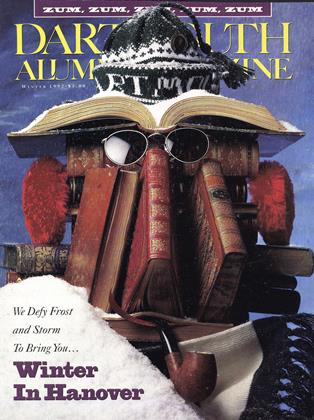"This may well be the last of Dartmouth's library expansions."
PRESIDENT ERNEST MARTIN HOPKINS, 1928
"I think it's true that this should be the last library expansion."
BRUCE PIPES, 1992
TO LOOK at these two groups, the librarians and the Kiewit people, the interface is fascinating," said Pipes.
"It's like a sociology experiment: the librarians are stable, conservative; the computer people are the anathema of stability. They want everything to change all at once."
As Dartmouth has struggled with these two tendencies, the librarians and computer programmers have begun to recognize that they are really speaking of two distinct but complementary needs. While most of the time researchers simply need an information engine (whether that be a card catalog or a Macintosh PowerBook 170), others demand an entirely different function of libraries—the traditional cultural availability Baker has provided for decades.
Right now Dartmouth has one of the few large research libraries in the world that still allow for open stacks. At most other colleges and universities with a library of Dartmouth's magnitude, students hand over little slips of paper and wait while librarians move through the stacks looking for their choices. At Dartmouth students can still wander the stacks, perusing and browsing and procrastinating through everything that happens to pass by on the shelves. Baker functions not only as a book repository; it is also the intellectual heart of the College. People meet there, study there, explore the halls and stacks, and revel in a general bookishness that only a solid-state library can provide.
Every afternoon, in the Sanborn adjunct to the library, tea is still served to the ruminating few who lie sprawled among the various couches. Down in the basement, where students quickly consume reserve texts they are allowed to take out for only a few hours, it often seems that half the people are just gazing about the room, examining and interpreting the surrounding Orozco murals. In the oppressively warm Tower Room on any given winter evening, many students are asleep; you can hear snoring from behind those stuffy, high-backed chairs that face the walls.
Baker has also been the site of many exhibits that the Kiewit engineers would be hard pressed to distribute through a network. Last year much wall space was devoted to an expository display on book binding. And Special Collections Curator Philip Cronenwett noted that alumni just wouldn't feel the same if they couldn't come back to Hanover and touch the socks of Daniel Webster. Some things do not lend themselves to computerization.
Katerina Klemperer, the libraries' director of computing projects, thinks the two sides will probably merge eventually. "We are having to become more involved in the computer business, and they have to become more and more involved in the information business," Klemperer said.
"Sure, the computer has had an impact on every aspect of your life, and it will be a different library soon because of it," said Librarian Margaret Otto. "But there will still be hardbound books."
Joining in the ongoing ritual of Sanborn Tea areMichelle Dogin '89 and Katharine Gagne '89.
 View Full Issue
View Full Issue
More From This Issue
-
 Feature
FeatureKnow Your Place
December 1992 By George J.Demko -
 Feature
FeatureCure1 For The Common Cold2 Proven3 At Dartmouth4!
December 1992 By TIG TILLINGHAST '93 -
 Cover Story
Cover StoryThe Ether Library
December 1992 -
 Cover Story
Cover StoryRethinking The Stacks
December 1992 By Tig Tillinghast '93 -
 Cover Story
Cover StoryWith Hard-bound Books, Who Needs Digital?
December 1992 -
 Cover Story
Cover StoryTechnology Now and in the Future
December 1992
Features
-
 Feature
Feature"The Era of the Shrug"
November 1960 -
 Feature
FeatureWhitman at Dartmouth—100 Years Ago
JUNE 1972 -
 Feature
FeatureWhat We Do Best
December 1994 -
 Cover Story
Cover StoryTIME-SHARING PUNCH CARDS
MARCH | APRIL 2014 -
 Feature
FeatureThe View from the Women's Locker Room
JUNE 1983 By Agnes Kurtz -
 Feature
FeatureThe Senior Valedictory
JULY 1969 By KENNETH IRA PAUL '69


